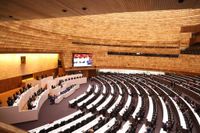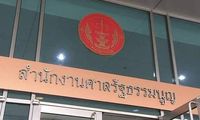On April 9, 2025, Thailand's Constitutional Court made a significant ruling regarding the authority of the Senate in the ongoing process of constitutional amendments. The court unanimously rejected a petition submitted by the Senate concerning the drafting of a new constitution, citing that the proposal was not properly presented to the Parliament. However, in a closely contested decision, the court voted 5 to 3 to accept a separate petition for the interpretation of the Senate's powers related to constitutional matters.
The court's ruling addressed two key issues raised by the Senate. The first issue was whether the process for drafting a new constitution could proceed, given that it had not been formally submitted for parliamentary discussion. This rejection was rooted in concerns that the proposed amendments might conflict with the will of the people, as they had not been thoroughly debated in the legislative assembly.
The second issue, which the court accepted for consideration, involved the interpretation of the Senate's authority under Section 210, paragraph (2) of the Constitution. This section pertains to the Senate's role in proposing amendments to the Constitution, a matter raised by Senator Premศักดิ์ เพียยุระ and MP Wisutthi์ Chaiyaroon of the Pheu Thai Party. The court's decision to accept this aspect of the petition indicates a willingness to clarify the Senate's powers in the context of constitutional amendments.
During the proceedings, the court reviewed the factual background and documents submitted, including records from a joint parliamentary session held on March 17, 2025. This session had concluded that there were indeed questions regarding the Senate's roles and responsibilities in the constitutional amendment process, leading to the majority vote to send these issues to the Constitutional Court for adjudication.
The five judges who supported the acceptance of the Senate's petition included Nakarin Mektrairat, Wirul แสงเทียน, Jiraniti หะวานนท์, Nopdol เทพพิทักษ์, and Sumet Roykulcharoen. In contrast, the dissenting opinions came from judges Panya Udchachon, Udom สิทธิวิรัชธรรม, and Borwornศักดิ์ วงศ์ปราชญ์. Notably, Judge Udom requested to withdraw from this case, citing previous involvement as a member of the drafting committee for the Constitution.
The implications of this ruling are significant as they set a precedent for how constitutional amendments will be handled in the future. It reflects the court's role in mediating between the legislative branch and the constitutional framework of Thailand.
In a related development on the same day, the Office of the Council of State (OCSG) convened to discuss issues surrounding the steel industry, particularly focusing on allegations of collusion and price manipulation. Secretary-General Wisanu Wongsinsirikul noted that the OCSG is expediting investigations into the operations of SKY Steel, following concerns raised about the company selling steel products below cost.
During this meeting, which was chaired by Minister of Industry, Ekkanat Prompan, the OCSG addressed the need for thorough inspections and quality testing of steel products, particularly in light of recent structural failures in buildings constructed with substandard materials. The meeting emphasized the importance of adhering to industry standards and regulations set forth by the Office of the Auditor General.
Two primary issues were discussed regarding the pricing of steel products: the legality of setting prices below cost and the potential for collusion among competing firms. The Office of the Council of State is particularly focused on ensuring that no anti-competitive practices occur in the market, which could harm consumers and undermine fair competition.
Wongsinsirikul stated, "If companies are found to be colluding to set prices or manipulate bids, they could face severe penalties under the Trade Competition Act of 2017." This act provides a framework for regulating business practices and ensuring fair competition, highlighting the government's commitment to maintaining market integrity.
As part of the ongoing investigation, the OCSG has already summoned representatives from China Railway Number 10 (Thailand) Co., Ltd. and Sin Keo Huayun Steel Co., Ltd. to clarify their roles in the bidding process and address the allegations of collusion. Both companies have expressed their intent to cooperate fully with the investigation.
The OCSG's proactive approach to these issues underscores the importance of regulatory oversight in the steel industry, especially as it relates to public safety and economic fairness. The collaboration between various government agencies aims to ensure that standards are upheld and that any violations are addressed swiftly.
In summary, the Constitutional Court's ruling on April 9, 2025, marks a pivotal moment in Thailand's constitutional law, clarifying the powers of the Senate in the amendment process. Concurrently, the government's efforts to regulate the steel industry reflect a broader commitment to maintaining fair competition and protecting consumer interests. Both developments are likely to have lasting impacts on the political and economic landscape of Thailand.






